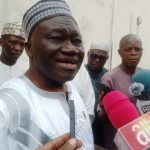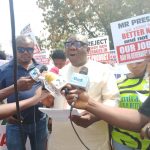Tinubu’s Scorecard Two Years On: Real Change or Reinvented Hardship?
By Dr. Aiyeku Olufemi Samuel
Is President Bola Ahmed Tinubu’s government falling short of expectations in securing the nation and reviving the economy?
This is a question that resonates loudly across markets, streets, campuses, and town halls. The citizenry—particularly the poor and middle class—are groaning under the weight of inflation, insecurity, and a policy terrain that seems more experimental than strategic.
Security: Hope Deferred or Abandoned?
Has the government shown capacity in addressing rampant insecurity? Daily, headlines echo kidnappings, banditry, and insurgency, with ransom demands rising and citizens living in fear. Between May 2023 and May 2024, over 3,000 Nigerians were kidnapped, according to SBM Intelligence. The North West and North Central regions remain flashpoints, and despite increased defense spending, the insecurity persists. The question is, what new security architecture has Tinubu introduced that previous administrations didn’t attempt?
Economy: Reforms or Regression?
Tinubu inherited a battered economy, but the pain of his reforms—subsidy removal, naira floatation, and aggressive tax restructuring—has bitten hardest on the poor. Inflation is at 34.19% as of June 2025, with food inflation once crossing over 40%, according to the National Bureau of Statistics (NBS).
Let’s examine the data:
Food inflation was 21.97% (YoY) in June 2025, a significant decline of 18.93 percentage points from the 40.87% recorded in June 2024.
In November 2024, food inflation stood at 39.93%, with sharp rises in prices of rice, fish, yam flour, and milk.
By December 2024, the rate was 39.84%, still 5.91 percentage points higher than in December 2023.
Despite recent improvements, the realities on the ground remain harsh for millions of Nigerians. The persistent food inflation has been driven by:
– Insecurity disrupting agricultural productivity
– Currency depreciation, raising the cost of imported essentials
– Rising production costs, especially fertilizers and fuel
– Supply chain breakdowns due to bad roads, fuel scarcity, and poor logistics
These challenges have triggered steep price hikes in staples like beans, rice, tomatoes, and yams. For many families, putting food on the table has become a luxury.
Is revenue enough to make economic impact? The government is boasting of improved FAAC disbursements and non-oil revenue, but when translated into real development, the impact is negligible. Despite claiming improved IGR, the lack of social safety nets deepens hardship across demographics.
NEFund: A Drop in an Ocean?
The recently launched Nigerian Education Loan Fund (NELFUND), targeting 300,000 student beneficiaries, is commendable. However, with over 1.6 million students across tertiary institutions, the scheme reaches less than 20%. The test lies in effective implementation, inclusion, and accountability.
Power: A Nation in Darkness
The power sector crisis is unresolved. Nigeria still generates under 5,000MW of electricity daily. What bold investment has this administration made in off-grid solutions or renewable energy?
Why should Nigerians pay more for darkness, while relying on generators and expensive fuel becomes the norm?
Investment, Debt & Development Imposition
FDI inflows dropped by over 26% in Q1 2025 compared to Q4 2024 (CBN data). Capital importation has stalled due to exchange rate instability and insecurity. Though MOUs worth \$30 billion have been signed in Saudi Arabia and India, tangible outcomes remain minimal.
Developmental projects often appear top-down and imposed. How many genuinely reflect the voices, priorities, and realities of everyday Nigerians?
Leadership & Governance: Affluence at the Top, Suffering at the Bottom?
Why should the government preach sacrifice while its leaders live in luxury? From new SUVs to lavish overseas trips, the cost of governance remains excessive.
Has President Tinubu shown empathy and responsibility to the people? His public engagements have been infrequent and aloof, failing to inspire trust or shared sacrifice.
Political Dynamics: Power, Opposition & The ADC Question
The African Democratic Congress (ADC) has voiced growing dissatisfaction with Tinubu’s government. Is there a genuine agitation, or is it a front for Atiku’s coalition?
Has multiparty democracy matured, or are we watching old players swap jerseys?
The APC and Nigeria’s Future: Made Better or Bitter?
Since 2015, the APC has governed with mixed results. While revenues have grown, so has poverty. Nigeria remains the 3rd most terrorized country in the world (GTI 2025) and is home to over 133 million multidimensionally poor people (NBS).
Is the hardship truly justified—or simply a mistreatment of national wounds?
Rhetorical Truths and Realities:
– Why must ordinary Nigerians suffer while political elites flourish?
– What has Tinubu done that other presidents didn’t attempt or achieve?
– Is the hardship reflective of real reform or leadership deficiency?
– Are we witnessing a hostile coalition takeover masked as agitation?
– Is this government in tune with the reality of Nigeria’s suffering masses?
Conclusion: A Time to Reflect, A Call to Action
Tinubu’s government must listen, recalibrate, and act wisely. Nigeria needs:
– Compassionate policies, not textbook theories
– Inclusive development, not elite projections
– Security with outcomes, not budgets alone
True leadership is not measured by speeches, but by the lives it touches.
And right now, the Nigerian people are hurting—deeply.
By:
Dr. Aiyeku Olufemi Samuel
Governance Analyst | Development Economist | Strategic Policy Advocate
Tinubu: Performance or Pain?
Has the APC government made Nigeria better or bitter?
Dr. Aiyeku Samuel evaluates Tinubu’s scorecard:
✅ Security still porous
✅ Food inflation bites despite slight drop
✅ NEFund helps few
✅ Power still unreliable
✅ Revenue up, but suffering worsens
✅ ADC agitation rising
✅ Luxury at the top, hunger at the bottom
📊 Real data. Real issues. Real questions.
👉 Read full article for full breakdown.
📩 \[Request full version or media rights]












